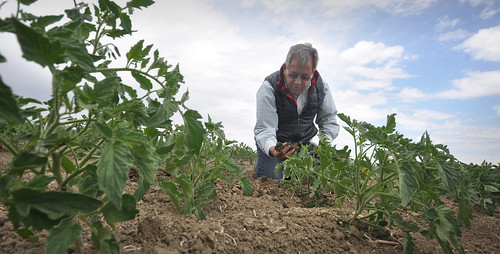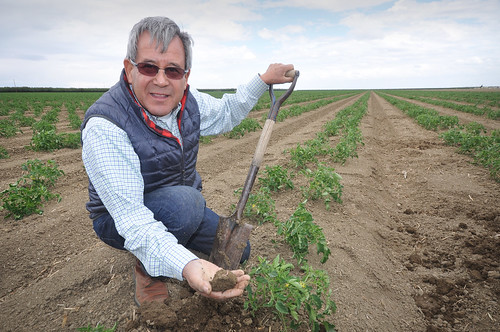
The White House recently recognized 12 Champions of Change for their leadership in sustainable and climate-smart agriculture. This week we will meet them through their USDA Regional Climate Hub, today featuring California’s Jesus “Jesse” Sanchez.
California is the nation’s number one agricultural production state with revenues of over $46 billion in 2013. State farmers and ranchers produce a diverse array of specialty crops, field crops, and livestock products. The top five by value in 2013 were milk, almonds, grapes, cattle and calves, and strawberries.
California is also home to more than 30 million acres of forested land, including many ecologically unique and economically important forest types as well as more than 40 million acres of rangeland. The state’s forests and grasslands, like those of other Western states, have long been shaped by fire and drought. California’s precipitation is highly variable from year to year and ranges from 60” on the North Coast to just a few inches in the southern deserts.
California agriculture, concentrated in the Central Valley, depends heavily on irrigation from a combination of groundwater wells and surface water delivered by state and federal projects. Since 2011, California has been in the grip of its worst drought on record.
Through the California Regional Climate Hub, USDA is working to bring land managers the science and tools that can help them adapt to changing weather and climate conditions. Many farmers, ranchers and land managers are already leading efforts to develop and demonstrate sustainable agricultural practices that benefit soil, air, and water quality while helping to mitigate climate change by reducing emissions. Educators and advisors have also been crucial in bringing science-based, sustainable, and climate-informed agricultural practices to the agricultural community.
These trends are expected to continue and become more unpredictable in the future. The Southwest Regional Vulnerability Assessment presents an overview of current conditions and trends, and provides adaptation and mitigation strategies for land managers and advisors with the best available information. The Hubs also support the implementation of climate-informed agricultural practices so rural communities and businesses can help slow the effects of climate change while creating jobs, growing the economy, and providing the quantity and quality of food, fuel and fiber needed to meet the needs of the region, nation and world.
The hubs rely on the support of early-adopters to help lead the agricultural community toward sustainable and productive practices that also conserve our nation’s natural resources. Jesus “Jesse” Sanchez was honored by the White House for his work in California.
Sanchez serves as the Farm Manager for Sano Farms, a diversified tomato, almond, wheat, garbanzo, and garlic farm spanning 4,000 acres in Firebaugh, California. Firebaugh is a small town of about 8,000 people in the heart of the West Side of the San Joaquin Valley. For over ten years, Sanchez has implemented innovative conservation agriculture practices including the use of cover crops and strip-tillage at Sano Farms. These practices have resulted in considerably less use of diesel fuel, lower emissions of dust, increased soil carbon, and reductions in soil water evaporation; all of which contribute to the farm’s resilience and sustainability. He has also been an eager spokesperson for these conservation farming practices, has hosted numerous tour groups and provided many presentations to farmers from all over the world who are eager to learn from him.
The Champions of Change like Sanchez are making a difference in California and we look forward to working with them and others like them to pave the way to a more resilient future.

